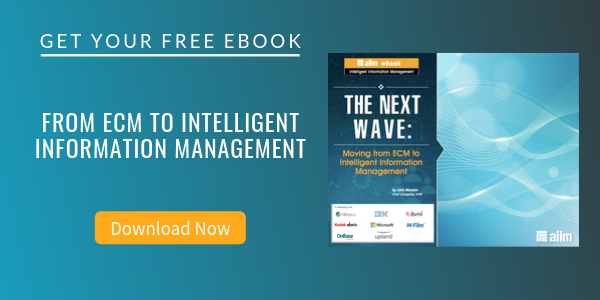
Be honest. How do YOU get around your organization's outdated systems and policies?
Enterprise Content Management (ECM)
I was recently talking to an AIIM member about accessing documents related to a project that we were both working on. So this will not be viewed as some sort of tacit endorsement, I’ll leave the name of the vendor out, but it’s a significant player in the enterprise sync and share space. I’ll also leave out the name of the AIIM member so he/she won’t get into trouble!
But I think this short story illustrates the totally unrealistic and counter-productive way most enterprises are looking at the incursion of consumer technologies into the enterprise. Consider the following.
When I mentioned the specific cloud file repository we were using for the project, the AIIM member said they couldn’t access the site because the "domain was blocked at work." As we talked about the implications of this, an old adage of mine came to mind -- the desire of the “business” to get work done by individuals will always trump our desire for organizational “control” of information.
The response of the AIIM member was this (paraphrasing): “It won’t be a huge problem to get around it. I’ll access the documents at home on a personal device, and then forward them to myself at work for reference during our conference call.”
Truth be told, this kind of stuff occurs all the time. And yet so many organizations persist in putting their heads in the sand and assume that if they wish it so (“we’ll keep information under control by just blocking the domain”), it will be so.
Our upcoming ECM Industry Watch provides some data documenting the head in the sand approach most organizations are taking when it comes to thinking about the question of mobile accessibility and the REAL patterns of how knowledge work is actually done in the year 2015.
Consider the answers to this question: What progress are you making towards content and process access on mobile devices? Is it any wonder that user adoption and utilization of most ECM systems remains a significant problem?
- 5% We have widespread access for staff and project partners
- 6% Most of our staff are able to access content and processes on mobile
- 10% We have mobile access to ECM content for those that need it
- 18% We are rolling out mobile access
- 16% We have plans for mobile access in the next 12-18 months
- 27% We have nothing planned as yet
The upcoming Industry Watch notes that 60% of organizations that have deployed ECM solutions agree with the statement, “Gaining user adoption has been a big problem for our ECM project.” 62% agree with the statement, "We still rely on file shares." And this is among organizations with ECM solutions!
I think a lot of this comes from a miscalculation of the true nature of information risk -- calculations that for many organizations are based on the outdated assumption that users have no choice with regards to the tools they use and that we can continue to "control" things the same way we did when all knowledge work was done at a desktop computer and in an office and on equipment owned and issued by central IT casting.
This comment from Michael Coleman, SVP & CIO at Comporium Communications illustrates the challenge facing organizations as they recalibrate risk in an era of consumerization and disruption:
“Deciding where to let go is a key element in managing overall risk. You need to decide what are actually corporate assets, and push processes to make sure they live in a specific place. There are not enough people to manage the volume. Make sure you get that foundational layer right.”
Alan Pelz-Sharpe spoke at the AIIM Conference about this challenge under the description of the “fragmented enterprise” and offers this advice to organizations:
- Data and traffic volumes are overwhelming – winners only manage essentials, don’t be a hoarder – Focus on IT efficiency
- Algorithms only tell us so much – winners invest in smart people to use, interpret, interact with and and ask the right questions
- BYO everything will be a reality – but not for everything, every time – there is a time and a place…
- Don’t chase fashions – focus on your customers and your products/services – more people and less technology may be the way forward
- Do watch emerging trends; some (not many) can be truly disruptive
- Manage data from creation to destruction – always
All of which brings me to a previous post: ECM in the era of Digital Disruption - When Riding a Dead Horse, Dismount.
We need to think about the question of information management and information security from a different vantage point – that of the knowledge worker – rather than that of central IT control. Because to be sustainable in an era of consumerization and digital disruption, a strategy must answer two questions for knowledge workers:
Where do I put my “stuff” so that it is secure, shareable, and searchable so that my ORGANIZATION can accomplish its goals?
AND
Where do I put my “stuff” so that it works the way I work and is useful to ME in getting my job done?
Until we recalibrate our strategies to deal with BOTH these questions, we will struggle to achieve a true strategy to effectively manage our information assets.
About John Mancini
John Mancini is the President of Content Results, LLC and the Past President of AIIM. He is a well-known author, speaker, and advisor on information management, digital transformation and intelligent automation. John is a frequent keynote speaker and author of more than 30 eBooks on a variety of topics. He can be found on Twitter, LinkedIn and Facebook as jmancini77. Recent keynote topics include: The Stairway to Digital Transformation Navigating Disruptive Waters — 4 Things You Need to Know to Build Your Digital Transformation Strategy Getting Ahead of the Digital Transformation Curve Viewing Information Management Through a New Lens Digital Disruption: 6 Strategies to Avoid Being “Blockbustered” Specialties: Keynote speaker and writer on AI, RPA, intelligent Information Management, Intelligent Automation and Digital Transformation. Consensus-building with Boards to create strategic focus, action, and accountability. Extensive public speaking and public relations work Conversant and experienced in major technology issues and trends. Expert on inbound and content marketing, particularly in an association environment and on the Hubspot platform. John is a Phi Beta Kappa graduate of the College of William and Mary, and holds an M.A. in Public Policy from the Woodrow Wilson School at Princeton University.



